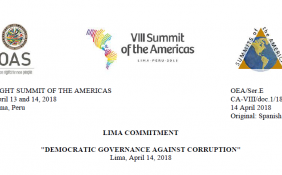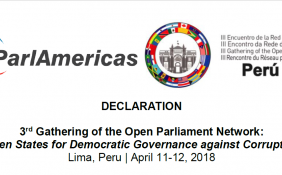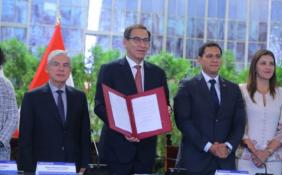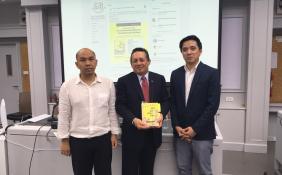News & Events

VIII SUMMIT OF THE AMERICAS - LIMA COMMITMENT
Lima Commitment "Democratic Governance Against Corruption", adopted by the Heads of State and Government of the Hemisphere during the VIII Summit of the Americas, held in Lima on 13th and 14th April 2018.

3ER ENCUENTRO DE LA RED DE PARLAMENTO ABIERTO DE PARLAMERICAS
DECLARATION
3rd Gathering of the Open Parliament
Network:
Open States for Democratic Governance
against Corruption
Lima, Peru | April 11-12, 2018
We, parliamentarians representing 25 countries in the Americas and the
Caribbean, gathered in Lima, Peru on April 11-12, 2018, for the 3rd
Gathering of the ParlAmericas Open Parliament Network, held on the occasion
of the VIII Summit of the Americas.
During this gathering, we discussed democratic governance against
corruption and the important role that legislatures play in confronting this
issue. The working sessions and dialogues allowed for the exchange of valuable
experiences and knowledge related to initiatives currently being adopted by our
parliaments that are inspired by the open parliament pillars and seek to fight
corruption in all branches of public office. We also discussed the importance
of encouraging initiatives that promote ethics and probity in the exercise of
parliamentary functions; the development of mechanisms aimed at empowering
women as central actors in governance strengthening and the fight against
corruption; and the definition of guidelines for drafting open parliament
action plans, which are being co-created with civil society.
In view of the above and,
Recognizing:
That corruption is one of the greatest challenges of
our time, given that it negatively impacts the economic and social development
of our countries; deepens social inequalities and limits access to services and
public goods; erodes citizen confidence in the political system and
delegitimizes democratic institutions; and, moreover, can hinder the
achievement of the goals of the 2030 Agenda for Sustainable Development;
That women, indigenous peoples and traditionally
marginalized groups are affected by corruption in greater proportion and/or in
different ways, and that their ability to denounce corrupt practices can be
limited by power dynamics and other social factors;
That international agreements like the United Nations
Convention against Corruption, the Inter-American Convention against
Corruption, and the Mechanism for Follow-Up on the Implementation of the
Inter-American Convention against Corruption (MESICIC) recognize the
international scope of corruption and are intended to promote and facilitate
cooperation between States in the fight this phenomenon;
That the legislative branch plays a vital role in the
fight against corruption through the exercise of its powers of representation,
legislation, and political oversight of actions by the public administration;
as well as in the adoption and development of regulatory frameworks related to
treaties and international conventions that address this fight;
That, in open States, the executive, legislative, and
judicial branches jointly undertake cross-cutting efforts to strengthen
governance in support of anti-corruption measures, through more transparent
institutions that are accountable and involve citizens, collaboration with
civil society, and alignment with the principles promoted by the Open
Government Partnership;
That parliaments have the responsibility to lead by
example in anti-corruption initiatives, promoting actions in support of
legislative openness, facilitating interaction between citizens and the
legislature, and guaranteeing access to public information, accountability, and
high standards for ethics and probity in parliamentary work, as well as the
participation of women from diverse socioeconomic backgrounds, in order to
ensure their points of view are considered within legislative initiatives
seeking to counteract corruption and the social inequalities that it can
exacerbate;
That open parliament action plans co-created by
parliaments and civil society are a useful mechanism for advancing initiatives
that promote the principles of legislative openness and contribute to
empowering citizens to hold their leaders and representatives accountable, and,
through this, confront corruption;
That advances in information and communications
technology have transformed the way in which citizens interact with and relate
to public institutions, and that the use of these technologies is indispensable
for modernizing and improving the efficacy and transparency of parliamentary
processes to exchange information with citizens and facilitate their
participation in parliamentary work;
That diplomacy and cooperation between parliaments and
between legislators on matters related to the prevention, investigation, and
prosecution of acts of corruption can consolidate the political support
necessary to extend this cooperation to the level of national governments; and
that the exchange of best legislative practices can contribute to the adoption
of more effective national laws;
We commit to:
1. Adopting legislation, regulatory frameworks, and practices that can
be effectively applied and that promote transparency, accountability, citizen
participation, and the highest ethical standards in the governance of our
institutions.
2. Promoting multi-party collaboration to adopt legislative initiatives
that contribute to the prevention of and fight against corruption, including,
but not limited to, the protection of whistleblowers, witnesses, and
individuals involved in investigating acts and cases of corruption; and the
financing and expenses of political organizations and parties.
3. Promoting a gender and intercultural perspective in all legislative
reforms or measures against corruption, taking into account that this disproportionately
affects women, and that it is therefore necessary to consider the impacts and
effects that all legislative initiatives that address this problem could have
on this population group; and through this contributing to the achievement of
the goals of the 2030 Agenda for Sustainable Development.
4. Facilitating cooperation between States in the fight against
corruption through the implementation of existing international conventions and
mechanisms, such as the United Nations Convention against Corruption, the
Inter-American Convention against Corruption, and the Mechanism for Follow-Up
on the Implementation of the Inter-American Convention against Corruption
(MESICIC).
5. Strengthening inter-institutional relations in order to establish
comprehensive legislative responses that curb corruption, promoting the
principles and values of the Open Government Partnership, and taking action
directed at advancing the open government agenda from the parliament.
6. Encouraging public integrity through strengthened parliamentary
codes of conduct, the regulation of conflicts of interest, and the development
of mechanisms aimed at preventing inequalities, discrimination based on gender
or ethnicity, and harassment in parliament.
7. Encouraging the creation and implementation of national open
government action plans, including open parliament action plans and other
mechanisms developed in collaboration with civil society; and exercising our
oversight role over the fulfillment of the commitments made in these plans.
8. Fostering transparency, responsibility, and openness to citizens in
our parliaments, utilizing information and communications technologies to
facilitate and strengthen interaction with the public, and the exercise of its
oversight functions.
9. Pursuing the adoption of priority measures agreed upon by our States
in the final declaration of the VIII Summit of the Americas, assisting in the
fulfillment of these commitments by our respective governments.
10. Strengthening inter-parliamentary cooperation, encouraging
inter-governmental cooperation and the exchange of legislative best practices
related to the fight against corruption in our hemisphere.
Adopted in Lima, Peru, April 12, 2018

PROMULGATION OF THE FRAMEWORK LAW ON CLIMATE CHANGE
On April 17, 2018, the President of the Republic of Peru, Mr. Martín Vizcarra, promulgated the Framework Law on Climate Change, being the first in South America after the entry into force of the Paris Agreement in 2016. The Law was approved by the Congress of the Republic of Peru on March 15.

PRESENTATION OF THE BOOK "THE FEAST OF THE GOAT" TRANSLATED TO THAI
The
Ambassador of Peru in Thailand participated in the book presentation of the
translation into Thai language titled "The Feast of the Goat" by the
Peruvian writer and Nobel Prize for Literature, Mario Vargas Llosa, carried out
by Bodthajorn Publisher which took place at the Thammasat University.
In his words, the Peruvian Ambassador thanked and congratulated the initiative of the publisher that made the first translation of a novel by a Peruvian author into Thai. He also noted that the diffusion of Peruvian literature in Thai language is the best way to know and approach our cultures and peoples.
PROMOTING PERUVIAN TOURIST DESTINATIONS IN THAILAND
March 27th our Embassy in Thailand held the meeting of Women International Club, which was hosted by the wife of the Head of the Peruvian Diplomatic Mission in the Asian country. During the meeting it also presented about the tourist attractions of Peru, gastronomy and history.

-
Emailinfo@peruthai.or.th
-
Telephone+662 260 6243/45/48
-
Address
EMBASSY OF PERU IN THAILAND
Glas Haus Bldg. 16th Floor.
Sukhumvit 25, Wattana,
Bangkok,10110
Thailand






